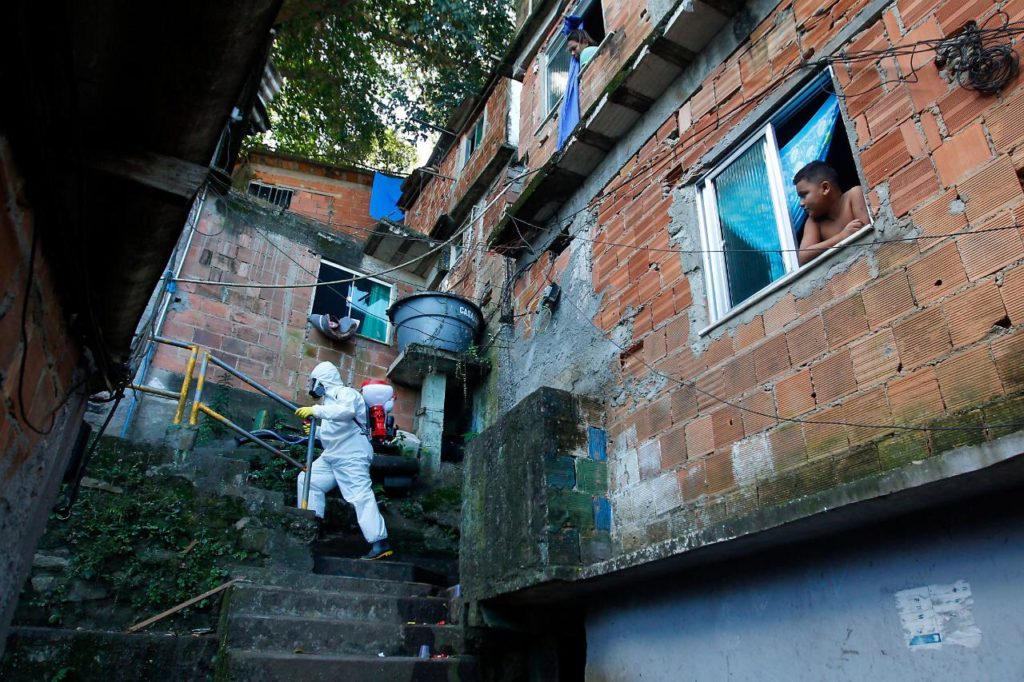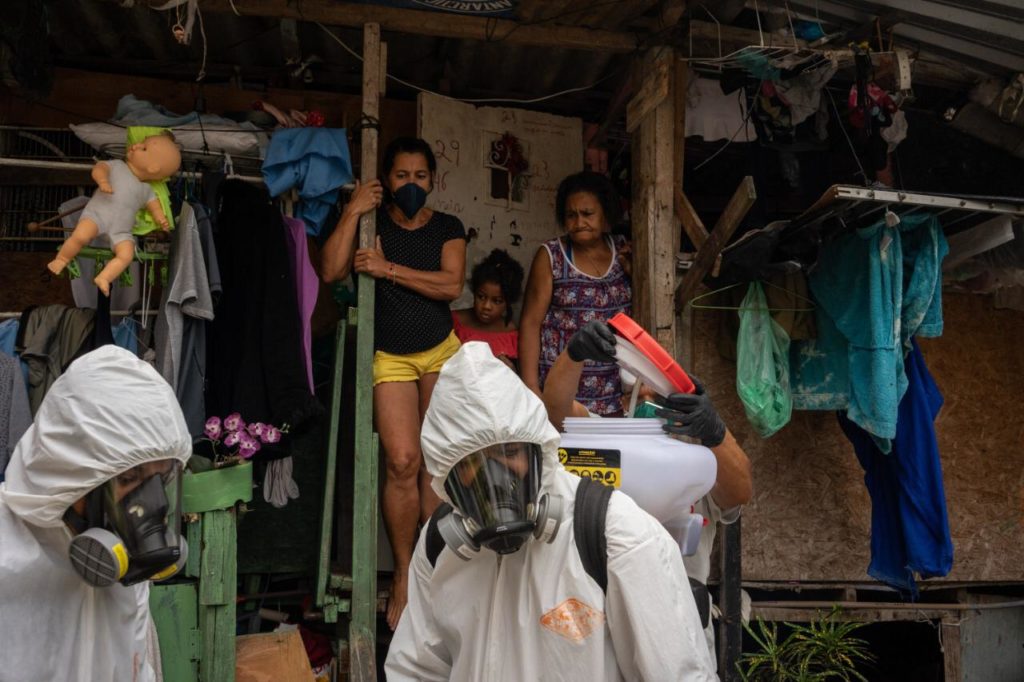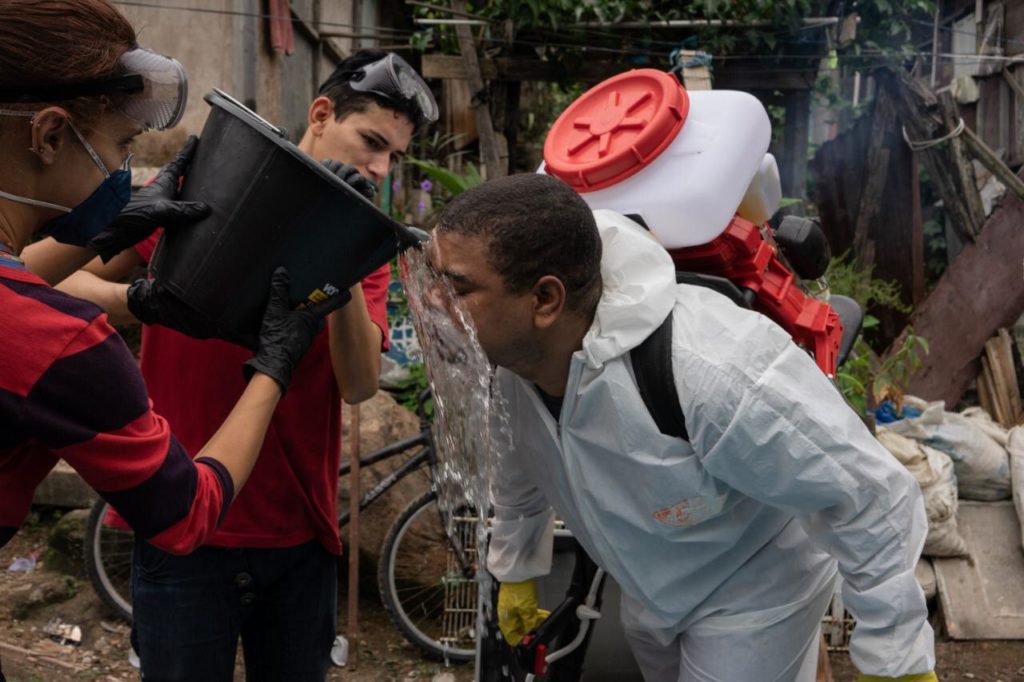This profile is part of a series on the healthcare workers, scientists and everyday Latin Americans making a difference during the coronavirus crisis
If you go up Santa Marta hill in Botafogo, Rio de Janeiro, you get a treat: the most amazing view of the famous statue of Christ and the Sugar Loaf, and you can take a selfie with a statue of Michael Jackson, who filmed parts of his “They Don’t Care About Us” video there. Jackson became possibly the first international superstar to go up the narrow lanes, unpaved passages, and cramped corners of the stacked bare zinc-roof cabins that make up this neighborhood.
Here, like in most favelas in Brazil, public services are all but nonexistent. So when the pandemic hit, a resident decided to act.
“We have all been watching this COVID issue on TV since they started talking about Wuhan in China,” Thiago Firmino told AQ. “So when it came knocking on our door, I was like, ‘Oh my God, it’s here. I need to do something.’”
Since then, twice a week, Firmino, his brother and five other volunteers have walked up and down the entire Santa Marta hill, a 5-hour trek, spraying disinfectant in an effort to kill the coronavirus on surfaces. Along the way, residents cheer him on.

Firmino does a 5-hour route twice a week to disinfect the alleys and stairs of Santa Marta hill. 
Neighbors watch as Firmino and his brother spray disinfectant in front of their home.
Taking action made sense for Firmino, a 39-year-old and serial entrepreneur who grew up in the Santa Marta community and dabbled in music, arts and dance. As a DJ, Firmino was literally the life of the party in the neighborhood, playing in weddings and celebrations. To ink a living, he started promoting walking tours of the neighborhood and organizing events for visitors and locals to meet – a business that died out when tourists disappeared due to the virus.
Firmino’s initiative reflects the resourcefulness and self-sufficiency that communities like Santa Marta must too often rely on to meet their needs.
“Favelas are already forgotten places,” Firmino told AQ. He says that with water service being intermittent at best, washing hands frequently is a luxury. Self-isolating in a room with only a bed to serve as couch and sleeping quarters is not an option for a family with children out of school, not to mention staying inside under a zinc roof in Rio’s blazing sun.

“Some 60% of residents are trying to stay home, but it is almost impossible for many,” said Firmino.
The details of Firmino’s disinfection grew out of his own curiosity.
“First those images from China looked to me like a ghost busters movie,” Firmino told AQ, “like something from another world!”
But Firmino started to recognize the details of those white-clad people pulverizing the streets: They were wearing protective goggles and overalls, like those used in a car paint shop. Working boots. The same spray machine used to spread pesticides on small farms.

“I started budgeting, to see how much it would cost to get the overalls and the sprayer, I already had boots and working goggles. I needed two of everything – one for me, one for my brother.”
And he also needed money.
The first offer to help came from far. Danish-American hip-hop producer Lucas Secon, who became a friend after taking the walking tour of Santa Marta, and two other artists he had introduced to Firmino, Danish rapper Gilli and producer Mass, decided to finance the equipment needed to get the disinfection project started.
“They know that I wouldn’t ask for money for nothing, they saw it was serious because where they are, people were dying, even more than in Brazil,” said Firmino. “I just asked for a contribution, they decided to send the whole amount.”
Then there was the issue of what to spray. Firmino has a technical degree in car detailing, and he tapped into that network figure out what to use. Paulo Vonixx, an entrepreneur that produces car detailing products, became his chemical mentor.
Firmino settled on a composite including benzalkonium chlorate, a chemical compound sometimes used in hospitals and which remains effective for a longer period of time than bleach.
“If a contaminated person arrives, the residue is still active.”
Communities around Rio and even in Bahia state have reached out to Firmino to learn the ropes and replicate the experience in their neighborhoods. “People are desperate. They want to prevent contamination,” said Firminho, who hopes others will be inspired by his effort.
“It is hard work, but then there is this great feeling when neighbors open their doors and offer to help.”







